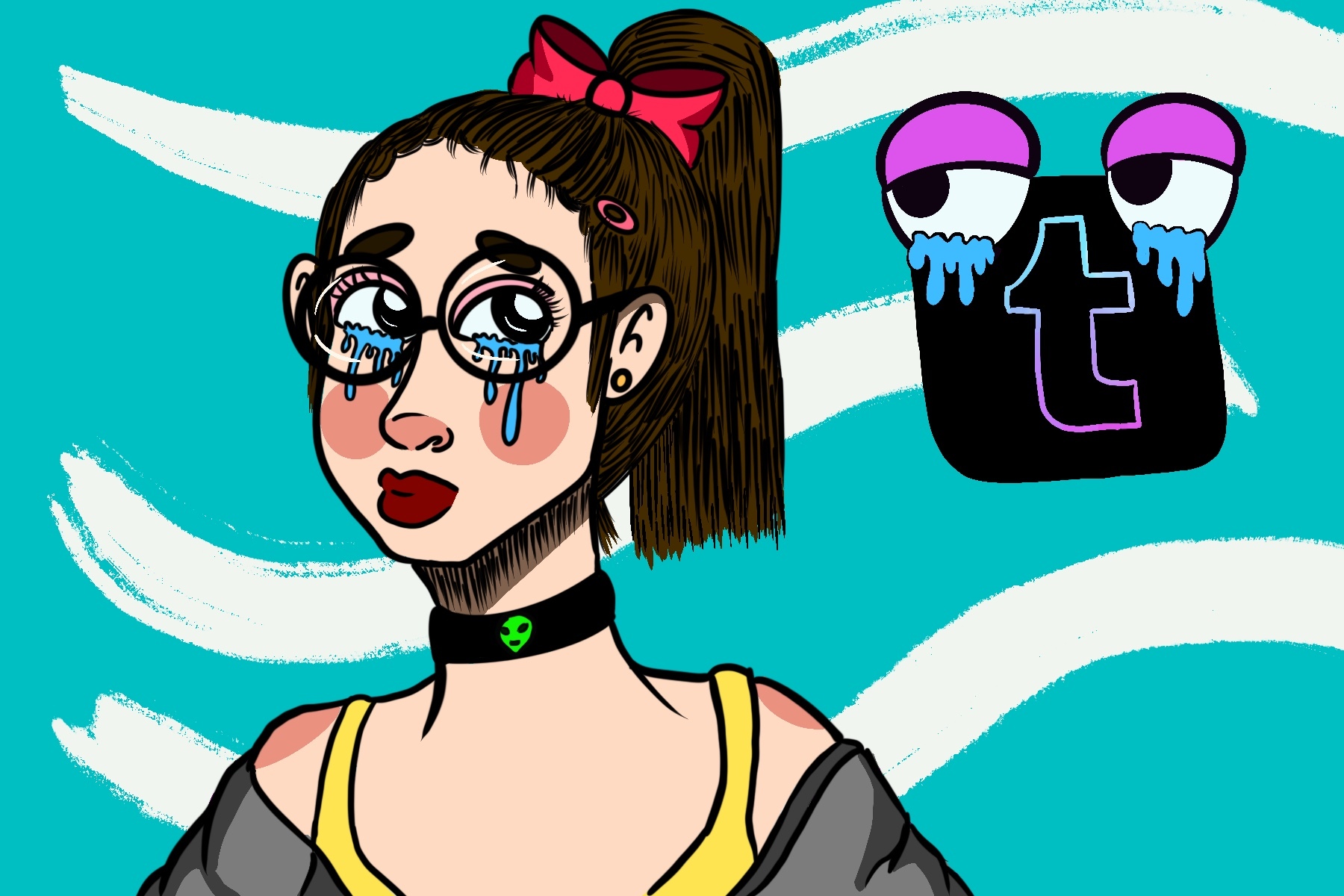In 2014, a soft grunge resurgence feverishly devoured the internet. Teenage girls’ wardrobes became filled with grayscale clothing, ripped black tights and Doc Marten boots. Their vinyl collections were edgy and expansive, with some highlights like “AM” by The Arctic Monkeys and “Nevermind” by Nirvana. The angst associated with growing up became a cult-like aesthetic, complete with depressing lyrics written on cigarette cartons, grainy black and white VSCO filters, graffiti art and drinking water dyed black.
Some of this depressing revolution’s figureheads include alternative indie musicians like Marina and the Diamonds, Lorde, and some of the mentally questionable characters from the TV show “American Horror Story” — who, while challenging society’s expectations, claimed that normal people were “scary.”
The birthplace that spawned the demographic that felt the need to go against the mainstream was the microblogging website Tumblr. Advertised as a place for “fandoms, art, and chaos,” it became the primary social media platform for pessimistic adolescents that didn’t get the hype behind Instagram or Twitter, rejecting their popularity in favor of something more niche.
But just like many other aesthetics prevalent on the internet, the trend was short-lived, burning out by 2016 in the same sort of whirlwind blaze that heralded its arrival. Sadly, with its demise, Tumblr fell back into its corner of the world wide web and was swiftly rebranded as cringe, becoming a ghost town made up of Superwholock GIFs blowing in the wind, while black-and-white photo collages bearing Lana del Rey lyrics stood as gravestones.
However, teenagers on TikTok have recently discovered the platform again and are calling for its revival. As billionaire Elon Musk attempts to purchase Twitter, many users of the social media platform feel that a renaissance is long overdue as they dust off their former Tumblr blogs. But, while observing modern internet politics and mannerisms, such a migration seems unlikely.
This is primarily because such an upheaval on the website would be just another fad that would lose steam after a few weeks. Of course, it’s well known at this point that the internet runs largely on the regurgitation of old trends and the lightning-quick attention spans of billions of people. However, trying to bring back the relevance of an entire website — versus, perhaps, a clothing style that could be easily discarded — seems more cannibalistic and borderline dystopian than anything else.
There are several reasons why a Tumblr revival could never happen. First, it’s important to note that many of the looks that were popular on the site in its heyday, including the soft grunge aesthetic, romanticized mental illness and eating disorders. Many of the users that became the most popular were “heroin chic” thin and the content they reblogged idealized depression and, therefore, became a way for them to broadcast their “eccentricity.”
While the way mental health is handled in online spaces today is far from healthy, the 2014 “Tumblr girl” was perhaps a harbinger of things to come. Tumblr is a much smaller website than most of the other social media platforms. It is estimated to be worth only $3 million after it was bought by Automattic from Yahoo, which had purchased it for a whopping $1.1 billion and eventually banned NSFW content. Automattic’s smaller server and staff meant the site was unable to deal with high traffic volumes.
Unlike many social media platforms, Tumblr does not operate on an algorithm. When you sign up to make an account, it doesn’t ask to find your contacts and it doesn’t generate an automatic stream of posts based on any other stored data. It also doesn’t track your location or generate relevant ad space or posts that you might be interested in.
Tumblr’s user dashboard relies heavily on the idea of community. For posts to circulate, they need to be “reblogged.” To receive content on Tumblr, you must look for it or create it — two things that the majority of people online simply do not do or have the attention span for. It also lacks a story feature, unlike many other social media platforms where content expires after 24 hours, which pressures its users to constantly post.
On Tumblr, there is nothing that openly displays your number of followers or the number of people you follow. For some, this feature might bring a much-needed breath of fresh air amid the constant popularity contests on the internet. Yet for many users, anonymity is not what they’re looking for.
However, such features were much more popular when the website was in its prime eight years ago. This was also when social media platforms were just beginning to gain momentum. In 2014, Facebook had not yet been put on trial for misusing the data of its users and TikTok simply did not exist. Overall, while the internet has been around since the 1990s, by 2010, Tumblr was in its early stages of social development and its users had not yet become simple commodities in the late-stage capitalist sphere that it’s now evolved into.
But this change in how we interact online should raise a red flag within the realm of internet etiquette. Why would the majority reject the ability to curate a more enjoyable browsing experience in favor of being spoon-fed content? And how did we get to this point?
Is it because the most popular social media websites mainly run off of the ad revenue produced by their user engagement — something Tumblr has tried and failed to do? Or is it because we simply never noticed that the social part of social media has slowly been washed away?
Regardless, it seems that many people online have ceased to think critically about the content they consume, no matter how they get it. The internet has slowly transformed into a mindless freefall, a rabbit hole with no Wonderland on the other side. That being said, maybe Tumblr should remain dead and keep its magic to itself.

















